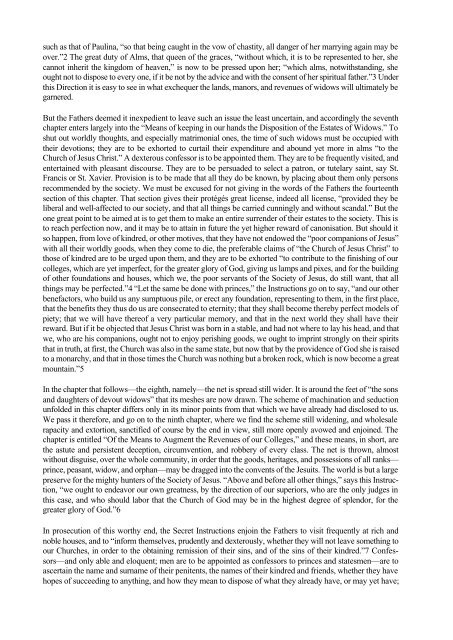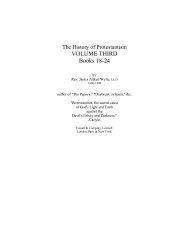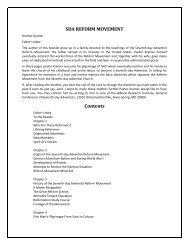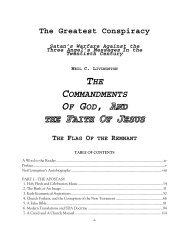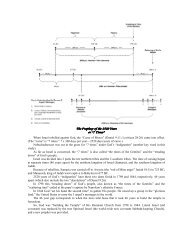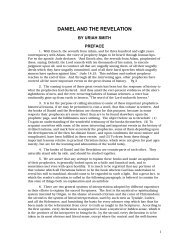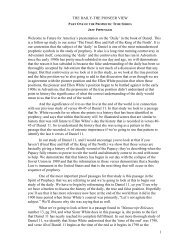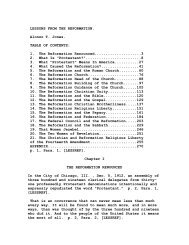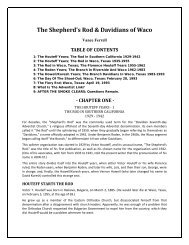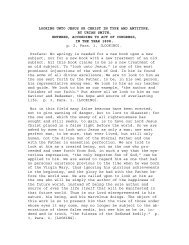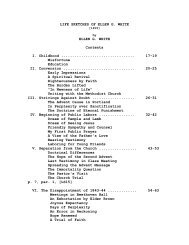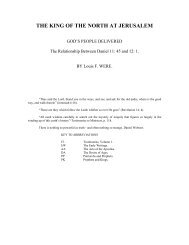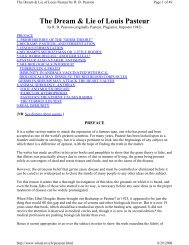History of Jesuits
History of Jesuits
History of Jesuits
Create successful ePaper yourself
Turn your PDF publications into a flip-book with our unique Google optimized e-Paper software.
such as that <strong>of</strong> Paulina, “so that being caught in the vow <strong>of</strong> chastity, all danger <strong>of</strong> her marrying again may be<br />
over.”2 The great duty <strong>of</strong> Alms, that queen <strong>of</strong> the graces, “without which, it is to be represented to her, she<br />
cannot inherit the kingdom <strong>of</strong> heaven,” is now to be pressed upon her; “which alms, notwithstanding, she<br />
ought not to dispose to every one, if it be not by the advice and with the consent <strong>of</strong> her spiritual father.”3 Under<br />
this Direction it is easy to see in what exchequer the lands, manors, and revenues <strong>of</strong> widows will ultimately be<br />
garnered.<br />
But the Fathers deemed it inexpedient to leave such an issue the least uncertain, and accordingly the seventh<br />
chapter enters largely into the “Means <strong>of</strong> keeping in our hands the Disposition <strong>of</strong> the Estates <strong>of</strong> Widows.” To<br />
shut out worldly thoughts, and especially matrimonial ones, the time <strong>of</strong> such widows must be occupied with<br />
their devotions; they are to be exhorted to curtail their expenditure and abound yet more in alms “to the<br />
Church <strong>of</strong> Jesus Christ.” A dexterous confessor is to be appointed them. They are to be frequently visited, and<br />
entertained with pleasant discourse. They are to be persuaded to select a patron, or tutelary saint, say St.<br />
Francis or St. Xavier. Provision is to be made that all they do be known, by placing about them only persons<br />
recommended by the society. We must be excused for not giving in the words <strong>of</strong> the Fathers the fourteenth<br />
section <strong>of</strong> this chapter. That section gives their protégés great license, indeed all license, “provided they be<br />
liberal and well-affected to our society, and that all things be carried cunningly and without scandal.” But the<br />
one great point to be aimed at is to get them to make an entire surrender <strong>of</strong> their estates to the society. This is<br />
to reach perfection now, and it may be to attain in future the yet higher reward <strong>of</strong> canonisation. But should it<br />
so happen, from love <strong>of</strong> kindred, or other motives, that they have not endowed the “poor companions <strong>of</strong> Jesus”<br />
with all their worldly goods, when they come to die, the preferable claims <strong>of</strong> “the Church <strong>of</strong> Jesus Christ” to<br />
those <strong>of</strong> kindred are to be urged upon them, and they are to be exhorted “to contribute to the finishing <strong>of</strong> our<br />
colleges, which are yet imperfect, for the greater glory <strong>of</strong> God, giving us lamps and pixes, and for the building<br />
<strong>of</strong> other foundations and houses, which we, the poor servants <strong>of</strong> the Society <strong>of</strong> Jesus, do still want, that all<br />
things may be perfected.”4 “Let the same be done with princes,” the Instructions go on to say, “and our other<br />
benefactors, who build us any sumptuous pile, or erect any foundation, representing to them, in the first place,<br />
that the benefits they thus do us are consecrated to eternity; that they shall become thereby perfect models <strong>of</strong><br />
piety; that we will have there<strong>of</strong> a very particular memory, and that in the next world they shall have their<br />
reward. But if it be objected that Jesus Christ was born in a stable, and had not where to lay his head, and that<br />
we, who are his companions, ought not to enjoy perishing goods, we ought to imprint strongly on their spirits<br />
that in truth, at first, the Church was also in the same state, but now that by the providence <strong>of</strong> God she is raised<br />
to a monarchy, and that in those times the Church was nothing but a broken rock, which is now become a great<br />
mountain.”5<br />
In the chapter that follows—the eighth, namely—the net is spread still wider. It is around the feet <strong>of</strong> “the sons<br />
and daughters <strong>of</strong> devout widows” that its meshes are now drawn. The scheme <strong>of</strong> machination and seduction<br />
unfolded in this chapter differs only in its minor points from that which we have already had disclosed to us.<br />
We pass it therefore, and go on to the ninth chapter, where we find the scheme still widening, and wholesale<br />
rapacity and extortion, sanctified <strong>of</strong> course by the end in view, still more openly avowed and enjoined. The<br />
chapter is entitled “Of the Means to Augment the Revenues <strong>of</strong> our Colleges,” and these means, in short, are<br />
the astute and persistent deception, circumvention, and robbery <strong>of</strong> every class. The net is thrown, almost<br />
without disguise, over the whole community, in order that the goods, heritages, and possessions <strong>of</strong> all ranks—<br />
prince, peasant, widow, and orphan—may be dragged into the convents <strong>of</strong> the <strong>Jesuits</strong>. The world is but a large<br />
preserve for the mighty hunters <strong>of</strong> the Society <strong>of</strong> Jesus. “Above and before all other things,” says this Instruction,<br />
“we ought to endeavor our own greatness, by the direction <strong>of</strong> our superiors, who are the only judges in<br />
this case, and who should labor that the Church <strong>of</strong> God may be in the highest degree <strong>of</strong> splendor, for the<br />
greater glory <strong>of</strong> God.”6<br />
In prosecution <strong>of</strong> this worthy end, the Secret Instructions enjoin the Fathers to visit frequently at rich and<br />
noble houses, and to “inform themselves, prudently and dexterously, whether they will not leave something to<br />
our Churches, in order to the obtaining remission <strong>of</strong> their sins, and <strong>of</strong> the sins <strong>of</strong> their kindred.”7 Confessors—and<br />
only able and eloquent; men are to be appointed as confessors to princes and statesmen—are to<br />
ascertain the name and surname <strong>of</strong> their penitents, the names <strong>of</strong> their kindred and friends, whether they have<br />
hopes <strong>of</strong> succeeding to anything, and how they mean to dispose <strong>of</strong> what they already have, or may yet have;


